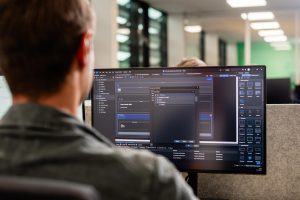From traditional shipbuilding to smart maritime: the role of low-code as a game changer in the maritime manufacturing industry
19 September 2024 • Blog

The maritime manufacturing industry in the Netherlands is under great pressure. Although as a water-rich country we are traditionally strong in shipbuilding, we are increasingly being overtaken by increasing competition from Asia. However, a strong Dutch maritime industry is crucial to our safety, innovativeness and earning power. An important spearhead of this sector is the move towards ‘smart maritime’; smart technology that makes shipping more efficient, safe and sustainable. Low-code can play an important role in this.
The main challenges of the maritime manufacturing industry
The opportunities, challenges and future plans for the maritime manufacturing industry are described in the document “No guts, no Hollands Glorie!“. This sector agenda was drawn up by the government together with the maritime sector and has a number of important conclusions. For example, we in the Netherlands are becoming increasingly dependent on the sea, not only for transport but also for our data traffic and the supply of green energy by large offshore wind farms. There are also more flood risks, shipping plays a crucial role in our military security and we have an economic interest in the earning power of the maritime sector. In addition, the sector must also become more sustainable.
For these major tasks, a strong Dutch maritime manufacturing industry is crucial. The sector agenda notes the importance of being able to design, build and maintain ships ourselves without being dependent on foreign countries. This requires innovative technologies and applications, such as smart ships that sail autonomously or obtaining real-time remote insight into the status of ships and parts. This will allow the maritime manufacturing industry to distinguish itself from the competition. At the same time, it will allow us to better protect our national interests.
Low-code as a driver of smart maritime
Ships have an average replacement period of thirty years and the average age of the world fleet is currently over 22 years. It is therefore not surprising that the maritime industry still makes extensive use of older technology and legacy software. But this does present a challenge: how do you make the most of the latest technologies when legacy software makes data difficult to access or real-time insights limited?
Benefits of deploying low-code in the maritime manufacturing industry
This is where low-code has a big role to play. The benefits of low-code, such as faster development of apps, the flexibility to make them perfectly compatible with existing systems, and built-in compliance and security, make it ideal for implementing solutions quickly and cost-effectively. This is essential to remain competitive. In doing so, there are several ways in which low-code can help the maritime industry innovate:
- Upgrading legacy technology
For ships or components with long lifespans, the software that supports this technology is sometimes a roadblock to innovations. With low-code, existing applications and functionalities can be quickly rebuilt or upgraded to modern and scalable technology without having to redesign the entire IT infrastructure. At B2B service provider Mourik, for example, Bizzomate used low-code to build a digital shell over the existing IT landscape in order to standardize the way the organization works.
- Democratizing data
Crucial data is often locked in legacy systems making it difficult to share and combine with other data sources. For example, it is sometimes difficult to combine data from onboarding sensors with data from the IT organization. Low-code helps to democratize that data and bring it together in responsive apps for up-to-date strategic insights. For example, Van Der Loo Yacht Interiors uses a low-code app to reduce material loss. This app brings all the information together in one place and gives Van Der Loo much more insight into what’s going wrong, allowing the process to be optimized, more insight into the biggest pain points and further improving efficiency.
- Innovate more often and faster
The high speed of development with low-code enables faster validation of ideas with working prototypes. Compared to traditional development methods, low-code makes building and iterating applications easier, faster and more scalable. As a result, you can involve customers and people from the business faster in the development of an idea, making it more compatible with daily practice on board, at the shipyard or in the port. For example, Bizzomate built an application for Royal IHC that accurately monitors ship performance, among other things to predict preventive maintenance. Rapid prototyping allowed findings to be validated quickly, while also ensuring customer understanding and cooperation during the implementation process.
- Standard safe
When deploying sensors and autonomous systems in critical infrastructure such as shipping, security is a top priority. The upcoming NIS2 legislation, which requires many organizations to strengthen their resilience against digital threats, puts this under an additional magnifying glass for many maritime organizations. Apps built with Mendix low-code meet important industry standards and security standards by default, ensuring their security. Henry Kraaijenbos, partner at Bizzomate: “In order to take the next step and strengthen our competitive position compared to abroad, the Dutch maritime sector has to fully focus on innovation. Low-code is ideally suited to navigate the specific challenges of the maritime industry and exploit innovation opportunities.”
Capturing innovation opportunities in the maritime sector?
Want to know more about low-code, our approach and how we help your organization make the step to smart maritime?
Bizzomate is an industry specialist and knows the unique challenges and opportunities of the maritime manufacturing industry.
We offer the flexibility and speed to shorten time-to-market and stay ahead of competition.
By transforming outdated systems, we also help your organization take the step to smart maritime. Schedule an introduction meeting right away.




